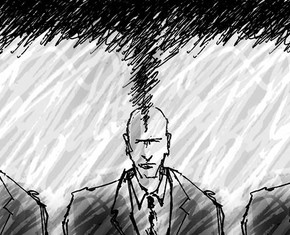The views expressed in our content reflect individual perspectives and do not represent the authoritative views of the Baha'i Faith.
Humanity today is witnessing one of the mightiest breakdowns in its history, a breakdown which the Baha’i teachings characterize as a turning point in the social evolution of humankind.
We are living at a time in history when two forces – disintegration and integration – are transforming an outdated and crumbling civilization while paving the way for the emergence of a new world order, which Baha’is believe has been set in motion by the revelation of Baha’u’llah.
Shoghi Effendi, the Guardian of the Baha’i Faith, described that process in his 1941 book The Promised Day Is Come:
A tempest, unprecedented in its violence, unpredictable in its course, catastrophic in its immediate effects, unimaginably glorious in its ultimate consequences, is at present sweeping the face of the earth …
RELATED: 5 Ways to Relax Your Mind and Body
This tempest of change has caused traditional values and beliefs to lose their influence. The process has universally impacted social, economic, and environmental components of civilization, resulting in distress and disintegration – so it’s no surprise that the stress people feel has risen to unprecedented levels.
We’re now experiencing one of those rare periods in human history when an old civilization dies and a new one emerges in its place.
Beyond the upheaval in all sectors of society, such a process of change has generated extensive and widespread stress and anxiety for each individual. Today, we must not only deal with the usual stresses, strains, and tests that come to everyone in their personal lives – we must also attempt to deal with the stress generated by the breakdown of societal norms, roles, and structures.
The Psychological Aspects of Stress
Stress, one of the most pervasive phenomena of our time, occurs when a substantial discrepancy exists between the demands made upon a person and the person’s capability to respond to those demands.
Finding productive ways to cope with that stress – which largely depends upon an individual’s skill and ability to carefully appraise social and environmental demands – has become a modern imperative. Stress is part of life and is unavoidable. Research shows that two-thirds of office visits to family physicians in North America are prompted by stress-related problems.
To deal with personal stress, it helps to understand how stress occurs. Psychological stress is not only triggered by external events. It also involves dealing with one’s internal tension, anger, and conflicts in order to respond and adapt to life challenges appropriately.
Too much stress can cause burnout, a phenomenon which occurs due to excessive or prolonged exposure to work-related stress and tedium, all manifested by symptoms of severe fatigue, emotional exhaustion, and a sense of personal devaluation and failure. Individuals suffering from burnout are often successful, highly dedicated, and hard-working, who may in some respects be identified as motivated Type A persons.
Dynamics of Responses to Stressors
Adaptive response to stress differs from person to person, because what causes stress for one individual may not be the same for another. In fact, one person’s feeling of stress may well be another person’s pleasure. Moreover, a person may respond differently to the same stressor at different points in time and in different environments. Stress, in one sense, can be seen not as an indication of maladjustment, but rather a reflection of a lifelong quest for inner psychological and spiritual growth.
The word “stress” was first used in the field of medicine by Hans Selye, a renowned scientist, in 1956. To Selye, stress indicated anything that strongly threatens human homeostasis, including any event that is perceived to threaten or actually harm a person. This element is referred to as a “stressor,” and it prompts a natural response, which may be mild or acute, to prepare the body for positive or negative challenges. Positive stress is referred to as “eustress,” but when stress has a strongly negative effect it can lead to an overwhelming feeling of tension or pain, and the body may or may not be able to cope. This condition is referred to as distress.
RELATED: How to Make the News a Little Less Traumatic
Unmanaged stress may lead to distress, and distress can lead to disease, such as post-traumatic stress disorder, known as PTSD. In times of severe stress, the body becomes more vulnerable to physical illness, as well. Diseases like influenza, colds, herpes, and allergies are more likely to worsen when we encounter severe stress, confirming the link between stress and the immune system, which protects us from harmful organisms that cause disease like bacteria, viruses, and other pathogens.
We all encounter stress and suffering in this material existence. However, an individual’s cognitive perception and analysis of a conflict or stressor will have an important bearing on the capacity and extent of the reaction toward that threat. If we can make sense out of an event or crisis and draw some objective conclusion which would give it meaning, that stressful outcome will more likely be perceived as less threatening. The eminent psychiatrist and author Viktor Frankl stated that “suffering ceases to be suffering in some way at the moment it finds a meaning, such as the meaning of sacrifice.”
The Baha’i teachings offer deep reflection on this mystery of stress and suffering. Abdu’l-Baha, in an address he gave in Paris in 1913, said:
Those who suffer most, attain to the greatest perfection. … Men who suffer not, attain no perfection. The plant most pruned by the gardeners is that one which, when the summer comes, will have the most beautiful blossoms and the most abundant fruit.
















Comments
Sign in or create an account
Continue with Googleor